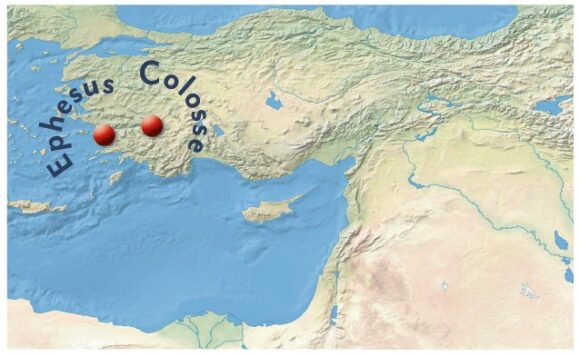WHEN THE APOSTLE Paul spent three years at Ephesus (Acts 20), the Gospel spread inland to such towns as Laodicea and Colosse (in what is modern Turkey), and congregations of believers were formed.
While Paul was a prisoner in Rome, he learned from Epaphroditus of problems which had arisen among believers at Colosse (Colossians 1:7). So he sent this Letter via Tychicus and Onesimus (4:7–9) to the ‘brothers in Christ’ (1:2), encouraging them to ‘continue in the faith, stable and steadfast, not shifting from the hope of the gospel that you heard’ (1:23) and to beware of ‘philosophy and empty deceit, according to human tradition’ (2:8).
The main problems at Colosse arose from Judaisers (Jews who insisted that Christians must follow the Law of Moses) and Gnostics (adherents of a Greek philosophy which valued special knowledge and experience). Paul rebuked those Jews who were still preoccupied with the Law of Moses—with ‘questions of food and drink, or with regard to a festival or a new moon or a Sabbath’, which are done away in Christ (2:16–17). He also warned against being caught up in Greek notions of angel worship (2:18). There was a cult of angel worship in Colosse.
The Head of the Body
The letter underlines the supremacy of the Lord Jesus Christ: there are no other intermediaries between God and humans, such as the Gnostics had invented. God has made His Son the head of all things, the centre of His purpose (1:16). He is the ‘head of the body, the church’ and the first of a new creation (1:18). We can only be saved through association with Christ. The process begins with belief and by being ‘buried with him in baptism’ (2:12). Baptized believers must continue to follow Christ closely; they must live the new life in Christ (3:1). This will involve ‘putting to death’ old ideas and ways, and putting on ‘the new self’ (3:8-14). Chapters 3 and 4 contain instructions for living the new life for ‘brothers and sisters in Christ’ (which is what the term ‘Christadelphian’ means).
Norman Owen
By kind permission of ‘The Christadelphian’
Some interesting links with other parts of the Bible:
- Colossians 1:15—see 2 Corinthians 4:4–6; Hebrews 1:3.
- Colossians 2:12—see Romans 6:4–6.
- Colossians 3:4—see 1 John 3:2.

